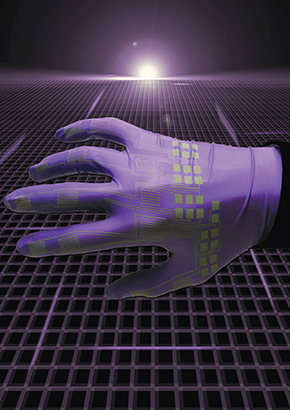
ALEX BOTTIGLIO / UNIVERSIDADE DE PURDUEElectronic circuits printed onto elastic material can be stretchedALEX BOTTIGLIO / UNIVERSIDADE DE PURDUE
Researchers from Purdue University in West Lafayette, Indiana, in the United States, have developed a new method to facilitate the large-scale production of ink-jettable, flexible, stretchable electrical conductors. The technique consists of dispersing a liquid metal in a non-metallic solvent, such as ethanol. According to the researchers, this process breaks the substance into minuscule particles that, when coated in gallium oxide, can pass easily through the nozzles of an ink-jet printer. After printing, the solvent evaporates, leaving only the particles, which are regrouped and transformed into a conductive material, according to a paper published in Advanced Materials on April 8, 2015. The researchers claim that the conductors made from liquid metal can be stretched and deformed without breaking, which means that the method allows printing onto fabrics and elastic materials. If the project moves forward, the technique could be used for the production of tiny, malleable robots that can move in confined spaces where they need to stretch in order to reach a target. Circuits printed onto stretchable wearables could also be used for therapeutic purposes.
Republish